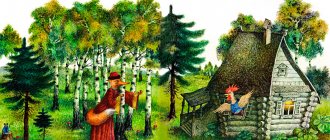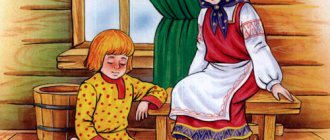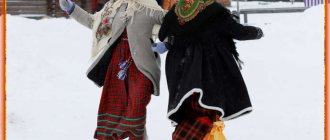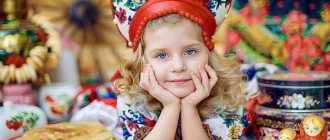Sivka-burka
To main
All authors
Home → Russian folk tales → Sivka-burka
Russian folk tale “Sivka-Burka, the prophetic kaurka” with illustrations by I. D. Sytin, 1916
Once upon a time there lived an old man, rich and literate. He had three sons, and he taught all his sons to read and write. His sons were good guys, and only the youngest son, Vanya, was somehow strange and always sat on the stove, for which they called him Vanyusha the Fool.
The time has come for the old man to die. He called his sons to him and said:
“When you bury me, come and take turns reading for three nights over my grave.”
The old man died, his sons buried him and held a wake. Now night comes, the eldest son needs to get ready for the grave, but he doesn’t want to.
- Vanyusha! - he shouted to his brother, “won’t you go and read at my father’s grave for me?”
“Why not go,” Vanyusha answers, getting off the stove, “I’ll go.”
- Come, dear!
Vanya got dressed, took a book with him and went. He began to read at the grave, and exactly at midnight his father came out to him and asked:
- Who reads? Eldest son?
- No, father, junior.
- Well, your happiness.
The old man whistled and shouted:
- Sivka-Burka, prophetic kaurka, stand in front of me like a leaf in front of the grass!
The horse runs, the earth trembles, flames come from the horse’s ears, and smoke pours out of its nostrils. The horse ran up to the grave and stopped dead in its tracks.
“Sivka-Burka, prophetic Kaurka,” said the old man, “serve my son faithfully, as you served me.”
The horse snorted in response and instantly disappeared from view, and the old man lay down in his grave.
Vanyusha came home in the morning.
- Well, how did you spend your night? - his brothers ask.
“Nothing,” the fool answers, “I read all night and nothing else.”
In the evening, the second son decided to get ready, but he became lazy, and he asks Ivan to go for him.
“Why don’t we go,” Ivan answered and began to get ready.
He came to the grave and began to read. Suddenly, at midnight, the father gets up.
- Who reads? Are you the middle son?
- No, father, youngest son, Vanya is a fool.
- Well, so much the better for you.
The old man whistled and shouted.
- Sivka-Burka, prophetic kaurka, stand in front of me like a leaf in front of the grass!
The horse runs, the earth trembles, flames come out of its ears, and smoke pours out of its nostrils. The horse came running and stopped dead at the grave.
“Sivka-Burka, prophetic kaurka,” said the father, “serve this son of mine faithfully, as you served me.”
The horse snorted in response and disappeared from view, and the old man lay down in the grave.
Vanya comes home in the morning.
- Well, how did you spend your night, Vanya? - his brothers ask.
“Nothing, okay,” answered Vanya, “I read all night.”
By evening, Vanya got off the stove and began to get ready. He came to the churchyard and reads at the grave. Exactly at midnight the old man got up.
- Is that you here, Vanya? - He said.
“I am, father,” answered Vanya.
The old man whistled and shouted:
- Sivka-Burka, prophetic kaurka, stand in front of me like a leaf in front of the grass!
The horse runs - the earth trembles, flames come out of its ears, and smoke pours out of its nostrils. He galloped up to the grave and stopped dead in his tracks.
“Sivka-Burka, prophetic kaurka,” said the old man, “serve my son faithfully, as you served me.” And you, Vanya, get into the horse’s right ear and get out of the left ear and you will become a fine fellow, blood and milk.
Ivan the Fool climbed into the horse's right ear, climbed out into the left ear and became a fine fellow, blood and milk.
“Well, now, Vanya,” said the old man, “get into the horse’s left ear and get out of the right ear, and you will be yourself again.” Ivan did as his father ordered, and the old man said to him:
“Now let go of the horse, and when you need it, go out into the field, whistle and shout: “Sivka-Burka, prophetic kaurka, stand in front of me like a leaf in front of the grass,” and the horse will appear.
The old man said goodbye to his son and went to his grave forever. And Ivan patted his horse on the neck, let him go and wandered home.
- Well, Vanya, how did you spend your night? - his brothers ask.
“Nothing, okay,” Ivan answers, “I read all night.”
So after that they began to live and get along. The two older brothers were working, and Vanyusha was still lying on the stove.
Suddenly a cry went out from the king throughout the kingdom:
- Gather everyone: boyars and nobles, merchants and townspeople and simple peasants to the Tsar for a holiday for three days; Take the best horses with you, and whoever rides on his horse to the princess’s mansion and tears off the portrait of the princess from the log chambers, the king will marry her to him.
Everyone, young and old, was alarmed. The brothers need to quickly ride their horses so that they can more nimbly gallop after the portrait, and Ivan sits on the stove and says to them:
- Yes, you should give me some kind of horse, I’d at least go and have a look!
And then his brothers got mad at him:
“Where are you going, fool,” they say. - You should sit on the stove and sleep.
And Ivan is not far behind, give it, he says, yes give it, so I had to give in to him.
“Well, if you really want it,” they tell him, “then take the lame filly!”
The brothers left, and Ivan sat on a three-legged mare and rode out of the outskirts into an open field. There he got off the mare, let her go, and he whistled and shouted:
- Sivka-Burka, prophetic kaurka, stand in front of me like a leaf in front of the grass!
The horse runs - the earth trembles, flames pour out of its ears, smoke flies from its nostrils. Ivan the Fool climbed into the right ear, and came out into the left and became a fine fellow, blood and milk. He sat down on Sivka-Burka and galloped off to tear off the portrait.
There were literally no people in the city, and when they saw a young man on an amazing horse, everyone began to look. Vanyusha accelerated his horse and galloped towards the mansions - only he did not jump three logs. Everyone saw how this handsome man arrived, but no one saw how he left: he disappeared like a whirlwind.
And Ivan the Fool galloped into the field, got off his horse, got into his left ear, got out of his right ear, let go of the horse, caught his nag, sat on it and rode home.
Soon the brothers arrived and all they had to talk about was what they had seen in the city.
- What a fine fellow, what a handsome fellow, and what a horse he has! - they said.
“Apparently he came to tear down the portrait?” - Vanya asked from the stove.
“Yes,” the brothers answered, “and I almost lost it.” That's right, he will come again. And disappeared like a whirlwind!
“Wasn’t it me, brothers?” - Ivan noted.
- You've obviously gone crazy, sitting on the stove! - the brothers shouted. - Sit down!
The next day, the brothers had just left and Ivan the Fool got on his little mare and drove out of the outskirts. There he whistled and shouted:
- Sivka-Burka, prophetic kaurka, stand in front of me like a leaf in front of the grass.
The horse runs - the earth trembles, flames come out of its ears, and smoke pours out of its nostrils. He ran up and stood in front of Ivan rooted to the spot. Ivan got into the right ear, came out into the left and became a fine fellow, blood and milk. He jumped on his horse and rushed into the city. Approaching the mansion, he accelerated his horse, galloped and almost reached the portrait. The people saw him arrive, but no one saw him leave: he disappeared like a whirlwind.
And Ivan the Fool let Sivka-Burka go into the field, and he himself came home on a filly.
Following this, the brothers arrive.
- Well, what happened there? - Ivan asks them.
“That fellow came again,” the brothers answer, “and just missed the portrait.”
- Wasn’t it me? - says Ivan.
“Sit on the stove,” the brothers shouted, “don’t talk nonsense!” He was a handsome fellow. And what a horse!
On the third day the brothers went to the Tsar, and Ivan the Fool followed them out on a nag outside the outskirts, whistled and shouted:
- Sivka-Burka, prophetic kaurka, stand in front of me like a leaf in front of the grass!
The horse runs - the earth trembles, flames come out of its ears, and smoke pours out of its nostrils. Ivan the Fool climbed into the right ear, came out into the left and became a fine fellow, blood and milk. He jumped on his horse and galloped into the city, to the royal log chambers.
He accelerated the horse so that he galloped with all his might, and Ivan tore off both the portrait and the towel that was hanging over him.
People saw where the good fellow came from, but no one saw where he rode off: he disappeared like a whirlwind. Ivan arrived outside the outskirts, got off his horse, climbed into the left ear, climbed out into the right ear and let the horse go, and he trudged home on a filly, climbed onto the stove and waited for his brothers.
The brothers arrived and began to tell how the fellow tore off the portrait and rode off with it and the towel. And where - no one knows.
- Look carefully, brothers, was it not me?
- Shut up, fool! Sit on the stove! - the brothers shouted at him.
Soon the tsar announces that he is giving a feast, to which he convenes all the boyars, governors, merchants and peasants. The brothers began to gather, and Ivan went with them. He sat there in the royal chambers somewhere behind the stove and looked at him with his mouth open.
The princess began to treat the guests and provide them with beer and home brew, while she kept a watchful eye on everyone to see if any of them would wipe themselves off with her towel. Whoever wipes himself off is her fiancé. None of the guests dried themselves, and Ivan was sitting behind the stove; the princess did not see him and therefore carried him around. The guests left.
The next day, the king again gave a feast, but even at this feast the princess did not notice Ivan, and therefore she carried her away.
On the third day, the king again gave a feast and again the princess began to shower all the guests with beer and mash, and none of the guests wiped themselves with her towel.
“What kind of parable is this,” thought the princess: “but where is my betrothed?”
Then she looked behind the stove and saw a fool, his jacket was torn, he was covered in soot, his hair was disheveled. The princess poured a glass of beer and carried it to him.
The brothers look, grin and think: “Why is the princess bringing beer to our fool too!” And Ivan the Fool drank beer and dried her off with a towel. The princess took Ivan by the hand and led him to the king.
“Father,” she said, “here is my betrothed.”
The brothers gasped and thought:
“Isn’t the princess crazy that she’s taking Ivan the Fool as her groom?”
And our Ivan went into an open field, whistled and shouted: “Sivka-Burka, prophetic kaurka, stand in front of me like a leaf in front of the grass!”
The horse runs - the earth trembles, flames come out of its ears, smoke pours out of its nostrils. He came running and stood rooted to the spot. Ivan the Fool climbed into the right ear, came out into the left and became a blood and milk fellow. He jumped on his horse and rode to the royal court.
The brothers spent a long time trying to figure out what all this meant, but when they learned about Sivka-Burka, they regretted that they had not fulfilled their father’s behest.
Soon, the wedding was celebrated and a feast was given. I was at the feast, drinking honey, drinking beer, and it was running down my mustache, but it didn’t get into my mouth.
Next →
Thank you for reading the fairy tale “Sivka-Burka”!
Read all Russian folk tales To the main page (full list of works)
© “Online-Read.RF”, 2017-2022 Feedback
Online reading of the book Russian Folk Tales by A. N. Afanasyev in three volumes. Volume 2 Sivko-burko
No. 179 [1]Recorded in the Shadrinsky district of the Perm province. state peasant A. N. Zyryanov. The manuscript is in the VGO archive (r. XXIX, op. 1, no. 32 a, pp. 18 vol. - 22; 1850). AT 530 (= AA 530A. Sivko-burko). The plot is widely known in all European countries. Its variants are taken into account by AT in recordings made in North and South America in French, English and Spanish, as well as in Afro-Asian (Arab, Turkish, Caucasian, Indian) folklore material. Russian variants - 60, Ukrainian - 41, Belarusian - 14. Variants similar to the East Slavic ones and significantly different from them are found in the folklore of many peoples of the Soviet Union (Bashk. tvorch., II, no. 18; Tat. tvorch., I, no. 65, 66, 80; Azerb.sk., pp. 124-135). Individual motives of this plot can be traced by researchers in Western European folklore and literary material, starting from the 13th century (see: Boberg JM Prinsessen pă glassbjoerget. - Danske Studier, 1928, pp. 16-53). The history of fairy tales on Western European cultural soil is associated with folk books of the late Middle Ages. In the 18th century The fairy-tale story about the liberation of the king's daughter, who was on a glass mountain, from a spell was processed in poetic form by the English poet Alexander Pope and the German poet K. F. Nikolai. This plot was uniquely reflected in Washington Irving’s short story “Prince Ahmed al Kamal” (1825). A literary adaptation of a Czech folk tale is Bozena Nemcova's tale “The Magic Sword” (1845). In East Slavic, especially Russian, folklore and popular print material, a very different type of plot type 530 prevails from Western European fairy tales about the glass mountain: three brothers take turns keeping watch at night at their father’s grave; the youngest (Ivan the Fool) receives from his deceased father the magic horse Sivka-Burka and thanks to him wins the grooms' competition - he gallops to the princess, who is in a high mansion, kisses her, receives a ring from her and ultimately marries her. The text of Afanasyev’s collection is typical for the tales of Sivka-burka. The first publications date back to the 18th century. (Medicine .., pp. 189-236; Timofeev, pp. 173-218). Folk tales of this type have been literary processed many times. The most successful of the adaptations are: “Sivka-burka” by K. D. Ushinsky and the fairy tale by A. N. Tolstoy under the same name. Research: Meletinsky, p. 133-142; Novikov, s. 112-113. Mythological interpretation of the fairy-tale image of Sivka-burka - see: Afanasyev. Poet. views, I, p. 616-628. Afanasyev made several minor amendments to the text, for example, in Afanasyev’s printed text “Where the hell should you be! Sit, you fool, on the stove” (in the manuscript: “Where the hell should you be, you fool, sit on the stove”); “after a little time” (in the manuscript: “After a little time”). See comment. to II volume of Afanasyev's fairy tales, ed. 1938 (p. 590).
Once upon a time there lived an old man; he had three sons, the third from Ivan the Fool, who did nothing but sit on the stove in the corner and blow his nose. The father began to die and said: “Children! When I die, you each take turns going to my grave to sleep for three nights,” and he died. The old man was buried. Night comes; The big brother needs to spend the night at the grave, but he is too lazy and afraid, so he says to his little brother: “Ivan is a fool! Go to your father’s grave and spend the night for me. You’re not doing anything!” Ivan the Fool got ready, came to the grave, and lies there; at midnight the grave suddenly parted, the old man came out and asked: “Who’s there? Are you a big son? - “No, father! I, Ivan the Fool." The old man recognized him and asked: “Why didn’t your son come?” - “And he sent me, father!” - “Well, your happiness!” The old man whistled and nut[2] Nut - shout, click. with a heroic whistle: “Sivko-burko, prophetic funnel!” Sivko runs, only the earth trembles, sparks fly out of his eyes, and a column of smoke comes out of his nostrils. “Here is a good horse for you, my son; and you, horse, serve him as you served me.” The old man said this and lay down in the grave. Ivan the Fool stroked and caressed Sivka and let him go, he went home. At home, the brothers ask: “What, Ivan the Fool, did you spend the night okay?” - “Very well, brothers!” Another night comes. The middle brother also does not go to spend the night at the grave and says: “Ivan the fool! Go to the priest’s grave and spend the night for me.” Ivan the Fool, without saying a word, got ready and drove off, came to the grave, lay down, and waited until midnight. At midnight, the grave also opened, the father came out and asked: “Are you the middle son?” “No,” says Ivan the Fool, “it’s me again, father!” The old man gave a nut in a heroic voice and whistled with a brave whistle: “Sivko-burko, prophetic funnel!” Burko runs, only the earth trembles, flames blaze from his eyes, and a column of smoke comes out of his nostrils. “Well, burko, as you served me, so serve my son. Go now!” Burko ran away; the old man went to his grave, and Ivan the Fool went home. The brothers ask again: “How did it feel, Ivan the Fool, did you spend the night?” - “Very well, brothers, okay!” On the third night it was Ivan’s turn; He didn’t wait around, got ready and went. Lies on the grave; at midnight the old man came out again, he already knew that Ivan the Fool was here, he gave a nut in a heroic voice, and whistled with a valiant whistle: “Sivko-burko, prophetic funnel!” The funnel runs, only the earth trembles, flames blaze from its eyes, and a column of smoke comes out of its nostrils. “Well, Voronko, as you served me, so serve my son.” The old man said this, said goodbye to Ivan the Fool, and went to his grave. Ivan the Fool stroked the funnel, looked and let go, and went home himself. The brothers ask again: “How did it feel, Ivan the Fool, did you spend the night?” - “Very well, brothers!”
Live; two brothers are timid[3]Working, but Ivan the Fool is doing nothing. Suddenly a cry from the king: if anyone tears the princess’s portrait from the house through many logs, he will give her in marriage. The brothers gather to see who will tear down the portrait. Ivan the Fool sits on the stove behind the chimney and shouts: “Brothers! Give me some kind of horse, I’ll go and have a look.” - “Eh! - the brothers got angry at him. - Sit, fool, on the stove; what are you going to do? Make people laugh, or something!” No, there is no retreat from Ivan the Fool! The brothers could not fight back: “Well, you fool, take that three-legged filly!”
They left on their own. Ivan the Fool followed them into an open field, into a wide expanse; he got down from the little mare, took her, slaughtered her, took off her skin, hung her on a cattle pasture, and threw away the meat; he whistled with a valiant whistle, and said in a heroic voice: “Sivko-burko, prophetic funnel!” Sivko runs, only the earth trembles, flames blaze from his eyes, and a column of smoke comes out of his nostrils. Ivan the Fool got in one ear - got drunk and ate, got out in the other - got dressed, he became such a fine fellow that even his brothers wouldn’t recognize him! He sat down on the sivka and went to tear off the portrait. There were no visible or invisible people here; They saw the young man and everyone started watching. Ivan the Fool overtook him with all his might, his horse jumped and the portrait was only missed by three logs. They saw where they came from, but didn’t see where they went! He let go of the horse, came home himself, and sat down on the stove. Suddenly the brothers arrive and say to their wives: “Well, wives, what a fine fellow he has come, we have never seen anything like this! The portrait was not reached only after three logs. We saw where he came from; they didn’t see where he went. He’ll come again…” Ivan the Fool sits on the stove and says: “Brothers, wasn’t I here?” - “Where the hell should you be! Sit, you fool, on the stove and wipe your nose.”
Time is running. The same cry from the king. The brothers began to gather again, and Ivan the Fool said: “Brothers! Give me a horse sometime." They answer: “Stay at home, fool! You will begin to transfer a horse to another!” No, they couldn’t fight back, they ordered to take the lame mare again. Ivan the Fool managed that one too, slaughtered it, hung the skin on the cattle, and threw away the meat; he whistled with a valiant whistle, and said in a heroic voice: “Sivko-burko, prophetic funnel!” Burko runs, only the earth trembles, flames blaze from his eyes, and a column of smoke comes out of his nostrils. Ivan the Fool climbed into the right ear - got dressed, jumped out to the left - became a fine fellow, jumped on his horse, rode off; I couldn't get the portrait only for two logs. They saw where they came from, but didn’t see where they went! Burka let him go, and he went home, sat down on the stove, and waited for his brothers. The brothers arrived and said: “Women! The same fellow came again, but he couldn’t get the portrait for only two logs.” Ivan the Fool says to them: “Brothers, wasn’t I here?” - “Sit down, fool! Where the hell was it!”
After a little while, the king called again. The brothers began to get ready, and Ivan the Fool asked: “Give me, brothers, some kind of horse; I’ll go and have a look.” - “Sit at home, you fool! How far will you transfer our horses?” No, they couldn’t fight back, they fought and fought, and they ordered to take the thin mare; they left on their own. Ivan the Fool managed that one too, stabbed it, abandoned it; he whistled with a valiant whistle, and said in a heroic voice: “Sivko-burko, prophetic funnel!” The funnel runs, only the earth trembles, flames blaze from its eyes, and a column of smoke comes out of its nostrils. Ivan the Fool climbed into one ear - got drunk and ate, came out in the other - dressed like a charmer, got on his horse and rode off. As soon as I reached the royal palace, I tore off the portrait and my fly. They saw where they came from, but didn’t see where they went! He also let go of the funnel, went home, sat on the stove, waiting for his brothers. The brothers arrived and said: “Well, mistresses! The same fellow caught up with him today and tore off the portrait.” Ivan the Fool sits behind the pipe and shouts: “Brothers, wasn’t I here?” - “Sit down, fool! Where the hell have you been!
After a little time, the tsar held a ball and convened all the boyars, governors, princes, Duma members, senators, merchants, townspeople and peasants. And Ivan’s brothers went; Ivan the Fool did not lag behind, he sat down somewhere on the stove behind the chimney, looking at him with his mouth open. The princess treats the guests, brings beer to everyone and watches to see if anyone wipes himself with his fly? - he is her fiancé. Only no one wiped themselves off; but Ivan the Fool didn’t see him, so he walked around. The guests left. The next day the king held another ball; again they did not find the culprit, who tore off the fly [5]Scarf, towel... On the third day, the princess also began to bring beer to the guests from her own hands; I walked around everyone, no one wiped themselves with their fly. “What is this,” she thinks to herself, “my betrothed is not here!” I looked behind the pipe and saw Ivan the Fool there; his dress is thin, covered in soot, his hair stands on end. She poured a glass of beer, brought it to him, and the brothers looked and thought: the princess brings beer to a fool! Ivan the Fool drank and wiped himself with his fly. The princess was delighted, took him by the hand, led him to his father and said: “Father! Here is my betrothed." The brothers here felt like a knife to the heart, they thought: “Why is this princess! Have you lost your mind? Leads a fool to betrothed." The conversations here are short: a merry feast and a wedding. Our Ivan here became not Ivan the Fool, but Ivan the Tsar’s son-in-law; he recovered, he cleaned himself up, he became a fine fellow, and people didn’t recognize him! It was then that the brothers learned what it meant to go to sleep at their father’s grave.




